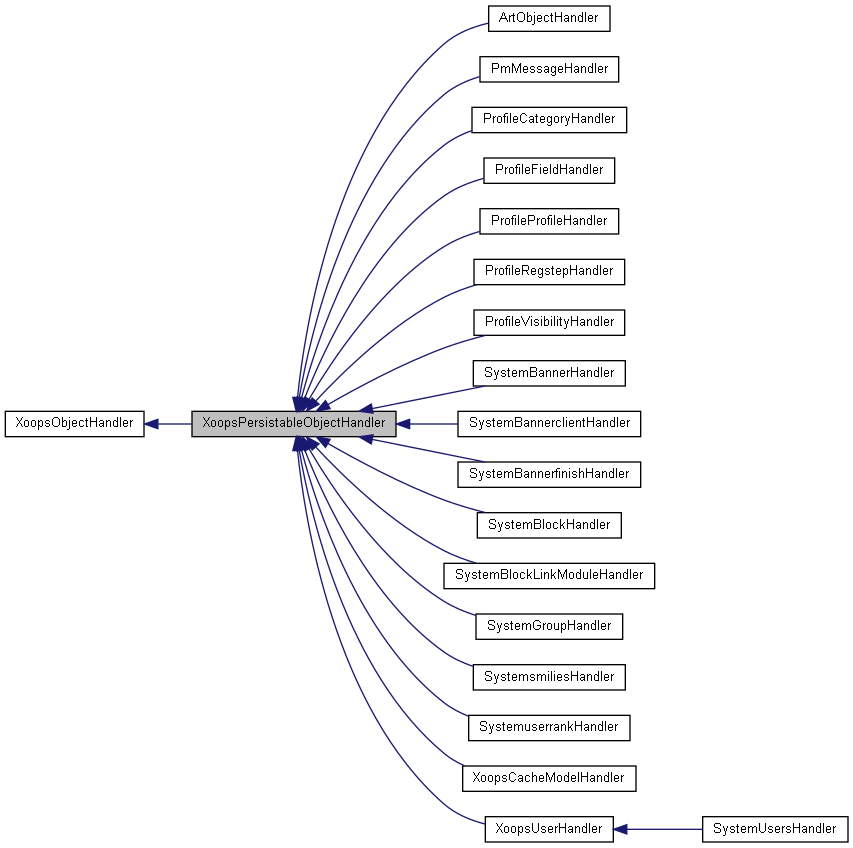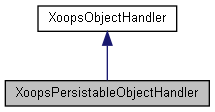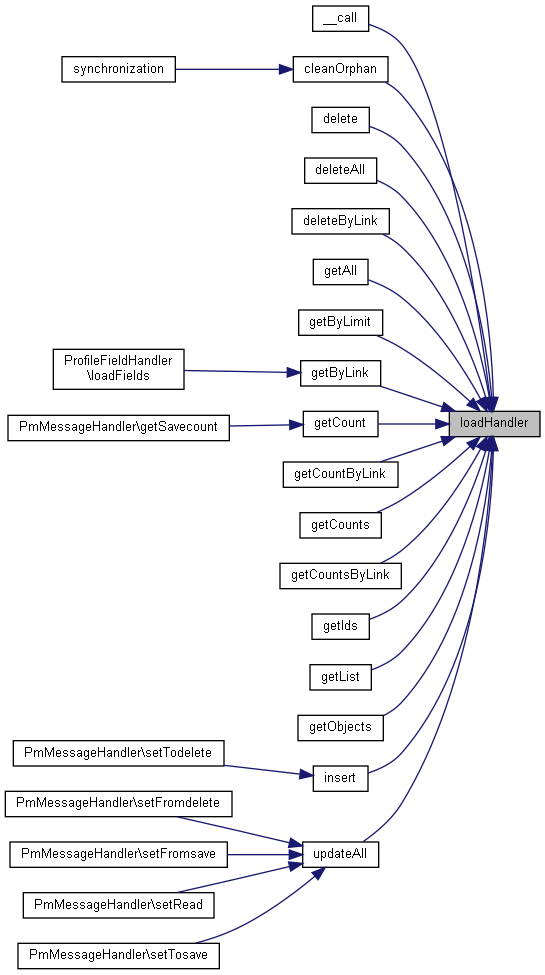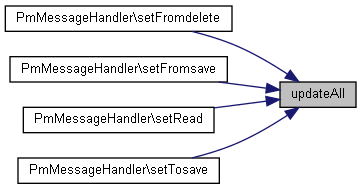 |
API - XOOPS 2.5.11 Beta 2
By monxoops.fr
|
 |
API - XOOPS 2.5.11 Beta 2
By monxoops.fr
|


Public Member Functions | |
| __construct (XoopsDatabase $db=null, $table='', $className='', $keyName='', $identifierName='') | |
| XoopsPersistableObjectHandler (XoopsDatabase $db=null, $table='', $className='', $keyName='', $identifierName='') | |
| setHandler ($handler=null, $args=null, $path=null) | |
| loadHandler ($name, $args=null) | |
| __call ($name, $args) | |
| create ($isNew=true) | |
| get ($id=null, $fields=null) | |
| insert (XoopsObject $object, $force=true) | |
| delete (XoopsObject $object, $force=false) | |
| deleteAll (CriteriaElement $criteria=null, $force=true, $asObject=false) | |
| updateAll ($fieldname, $fieldvalue, CriteriaElement $criteria=null, $force=false) | |
| & | getObjects (CriteriaElement $criteria=null, $id_as_key=false, $as_object=true) |
| & | getAll (CriteriaElement $criteria=null, $fields=null, $asObject=true, $id_as_key=true) |
| getList (CriteriaElement $criteria=null, $limit=0, $start=0) | |
| & | getIds (CriteriaElement $criteria=null) |
| & | getByLimit ($limit=0, $start=0, CriteriaElement $criteria=null, $fields=null, $asObject=true) |
| getCount (CriteriaElement $criteria=null) | |
| getCounts (CriteriaElement $criteria=null) | |
| & | getByLink (CriteriaElement $criteria=null, $fields=null, $asObject=true, $field_link=null, $field_object=null) |
| getCountByLink (CriteriaElement $criteria=null) | |
| getCountsByLink (CriteriaElement $criteria=null) | |
| updateByLink ($data, CriteriaElement $criteria=null) | |
| deleteByLink (CriteriaElement $criteria=null) | |
| cleanOrphan ($table_link='', $field_link='', $field_object='') | |
| synchronization () | |
| convertResultSet ($result, $id_as_key=false, $as_object=true) | |
 Public Member Functions inherited from XoopsObjectHandler Public Member Functions inherited from XoopsObjectHandler | |
| __construct (XoopsDatabase $db) | |
| XoopsObjectHandler ($db) | |
| create () | |
| get ($id) | |
| insert (XoopsObject $object) | |
| delete (XoopsObject $object) | |
Data Fields | |
| $handler | |
| $handlers = array('read' => null, 'stats' => null, 'joint' => null, 'write' => null, 'sync' => null) | |
| $table | |
| $keyName | |
| $className | |
| $identifierName | |
| $field_link | |
| $field_object | |
 Data Fields inherited from XoopsObjectHandler Data Fields inherited from XoopsObjectHandler | |
| $db | |
| __construct | ( | XoopsDatabase | $db = null, |
$table = '', |
|||
$className = '', |
|||
$keyName = '', |
|||
$identifierName = '' |
|||
| ) |
Constructor
| null | XoopsDatabase | $db | database connection |
| string | $table | Name of database table |
| string | $className | Name of the XoopsObject class this handler manages |
| string | $keyName | Name of the property holding the key |
| string | $identifierName | Name of the property holding an identifier name (title, name ...), used on getList() |


| __call | ( | $name, | |
| $args | |||
| ) |
Magic method for overloading of delegation
To be enabled in XOOPS 3.0 with PHP 5
@access protected
| string | $name | method name |
| array | $args | arguments |

| cleanOrphan | ( | $table_link = '', |
|
$field_link = '', |
|||
$field_object = '' |
|||
| ) |
*#- *#+ Methods of sync handler XoopsObjectSync Clean orphan objects against linked objects
| string | $table_link | table of linked object for JOIN |
| string | $field_link | field of linked object for JOIN |
| string | $field_object | field of current object for JOIN |


| convertResultSet | ( | $result, | |
$id_as_key = false, |
|||
$as_object = true |
|||
| ) |
| create | ( | $isNew = true | ) |
*#+ Methods of native handler XoopsPersistableObjectHandler create a new object
| bool | $isNew | Flag the new objects as new |
XoopsObject Reimplemented in ProfileProfileHandler.
| delete | ( | XoopsObject | $object, |
$force = false |
|||
| ) |
delete an object from the database
| XoopsObject | $object | XoopsObject reference to the object to delete |
| bool | $force |
Reimplemented in ProfileFieldHandler, and ProfileRegstepHandler.

| deleteAll | ( | CriteriaElement | $criteria = null, |
$force = true, |
|||
$asObject = false |
|||
| ) |
delete all objects matching the conditions
| CriteriaElement | $criteria | CriteriaElement with conditions to meet |
| bool | $force | force to delete |
| bool | $asObject | delete in object way: instantiate all objects and delete one by one |

| deleteByLink | ( | CriteriaElement | $criteria = null | ) |
Delete objects matching a condition against linked objects
| CriteriaElement | $criteria | CriteriaElement to match |

| get | ( | $id = null, |
|
$fields = null |
|||
| ) |
Load a XoopsObject object from the database
@access protected
| mixed | $id | ID |
| array | $fields | fields to fetch |
XoopsObject Reimplemented in ProfileProfileHandler.

| & getAll | ( | CriteriaElement | $criteria = null, |
$fields = null, |
|||
$asObject = true, |
|||
$id_as_key = true |
|||
| ) |
get all objects matching a condition
| CriteriaElement | $criteria | CriteriaElement to match |
| array | $fields | variables to fetch |
| bool | $asObject | flag indicating as object, otherwise as array |
| bool | $id_as_key | use the ID as key for the array |
XoopsObject 
| & getByLimit | ( | $limit = 0, |
|
$start = 0, |
|||
| CriteriaElement | $criteria = null, |
||
$fields = null, |
|||
$asObject = true |
|||
| ) |
get a limited list of objects matching a condition
| int | $limit | Max number of objects to fetch |
| int | $start | Which record to start at |
| CriteriaElement | $criteria | CriteriaElement to match |
| array | $fields | variables to fetch |
| bool | $asObject | flag indicating as object, otherwise as array |
XoopsObject 
| & getByLink | ( | CriteriaElement | $criteria = null, |
$fields = null, |
|||
$asObject = true, |
|||
$field_link = null, |
|||
$field_object = null |
|||
| ) |
*#- *#+ Methods of joint handler XoopsObjectJoint get a list of objects matching a condition joint with another related object
| CriteriaElement | $criteria | CriteriaElement to match |
| array | $fields | variables to fetch |
| bool | $asObject | flag indicating as object, otherwise as array |
| string | $field_link | field of linked object for JOIN |
| string | $field_object | field of current object for JOIN |
XoopsObject 

| getCount | ( | CriteriaElement | $criteria = null | ) |
*#- *#+ Methods of stats handler XoopsObjectStats count objects matching a condition
| CriteriaElement | $criteria | CriteriaElement to match |


| getCountByLink | ( | CriteriaElement | $criteria = null | ) |
Count of objects matching a condition
| CriteriaElement | $criteria | CriteriaElement to match |

| getCounts | ( | CriteriaElement | $criteria = null | ) |
Get counts of objects matching a condition
| CriteriaElement | $criteria | CriteriaElement to match |

| getCountsByLink | ( | CriteriaElement | $criteria = null | ) |
array of count of objects matching a condition of, groupby linked object keyname
| CriteriaElement | $criteria | CriteriaElement to match |

| & getIds | ( | CriteriaElement | $criteria = null | ) |
get IDs of objects matching a condition
| CriteriaElement | $criteria | CriteriaElement to match |

| getList | ( | CriteriaElement | $criteria = null, |
$limit = 0, |
|||
$start = 0 |
|||
| ) |
Retrieve a list of objects data
| CriteriaElement | $criteria | CriteriaElement conditions to be met |
| int | $limit | Max number of objects to fetch |
| int | $start | Which record to start at |

| & getObjects | ( | CriteriaElement | $criteria = null, |
$id_as_key = false, |
|||
$as_object = true |
|||
| ) |
*#- *#+ Methods of read handler XoopsObjectRead Retrieve objects from the database
| CriteriaElement | $criteria | CriteriaElement conditions to be met |
| bool | $id_as_key | use the ID as key for the array |
| bool | $as_object | return an array of objects |
Reimplemented in SystemBlockHandler.

| insert | ( | XoopsObject | $object, |
$force = true |
|||
| ) |
*#- *#+ Methods of write handler XoopsObjectWrite insert an object into the database
| XoopsObject | $object | XoopsObject reference to object |
| bool | $force | flag to force the query execution despite security settings |
Reimplemented in ProfileFieldHandler, ProfileProfileHandler, SystemBlockHandler, and ArtObjectHandler.


| loadHandler | ( | $name, | |
$args = null |
|||
| ) |
Load predefined handler
@access protected
| string | $name | handler name |
| mixed | $args | args |
XoopsModelAbstract // Following code just kept as placeholder for PHP5 if (!isset(self::$handlers[$name])) { self::$handlers[$name] = XoopsModelFactory::loadHandler($this, $name, $args); } else { self::$handlers[$name]->setHandler($this); self::$handlers[$name]->setVars($args); }
return self::$handlers[$name];


| setHandler | ( | $handler = null, |
|
$args = null, |
|||
$path = null |
|||
| ) |
Set custom handler
@access protected
| null | string | $handler | |
| null | $args | |
| string | $path | path to class |

| synchronization | ( | ) |
Synchronizing objects

| updateAll | ( | $fieldname, | |
| $fieldvalue, | |||
| CriteriaElement | $criteria = null, |
||
$force = false |
|||
| ) |
Change a field for objects with a certain criteria
| string | $fieldname | Name of the field |
| mixed | $fieldvalue | Value to write |
| CriteriaElement | $criteria | CriteriaElement |
| bool | $force | force to query |


| updateByLink | ( | $data, | |
| CriteriaElement | $criteria = null |
||
| ) |
update objects matching a condition against linked objects
| array | $data | array of key => value |
| CriteriaElement | $criteria | CriteriaElement to match |
| XoopsPersistableObjectHandler | ( | XoopsDatabase | $db = null, |
$table = '', |
|||
$className = '', |
|||
$keyName = '', |
|||
$identifierName = '' |
|||
| ) |
PHP 4 style constructor compatibility shim
| null | XoopsDatabase | $db | database connection |
| string | $table | Name of database table |
| string | $className | Name of the XoopsObject class this handler manages |
| string | $keyName | Name of the property holding the key |
| string | $identifierName | Name of the property holding an identifier name (title, name ...), used on getList() |

| $className |
| $field_link |
| $field_object |
| $handler |
holds reference to custom extended object handler
var object
@access private static protected
| $handlers = array('read' => null, 'stats' => null, 'joint' => null, 'write' => null, 'sync' => null) |
holds reference to predefined extended object handlers: read, stats, joint, write, sync
The handlers hold methods for different purposes, which could be all put together inside of current class. However, load codes only if they are necessary, thus they are now split out.
var array of objects
@access private static protected
| $identifierName |
| $keyName |
| $table |